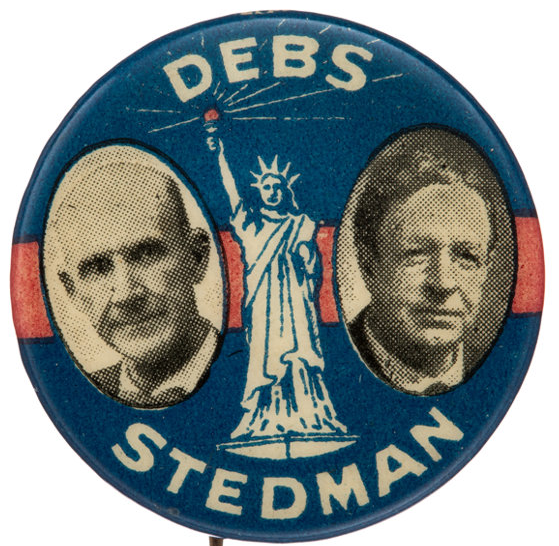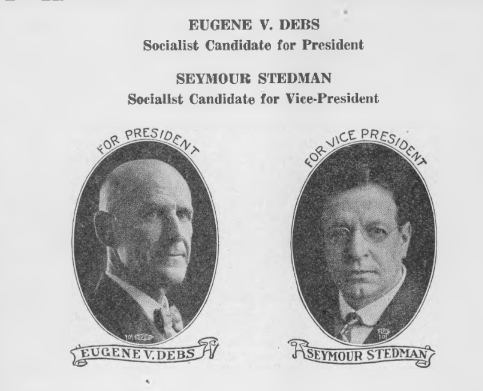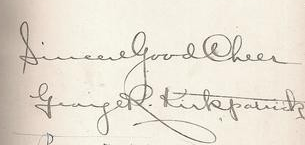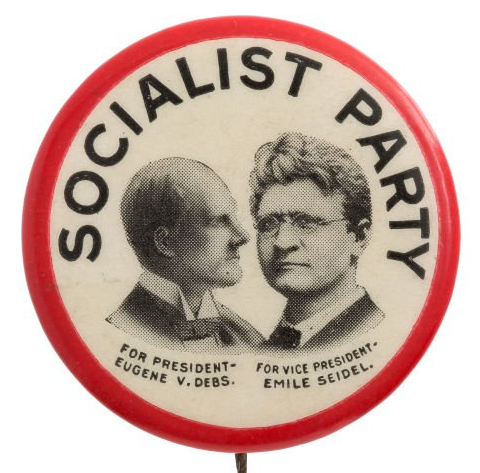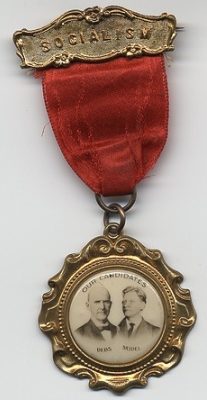Showing posts with label Socialist Party of America. Show all posts
Showing posts with label Socialist Party of America. Show all posts
Tuesday, June 25, 2019
Seymour Stedman
Seymour Stedman, July 4, 1871 (Hartford, Conn.) – July 9, 1948 (Chicago, Ill.)
VP candidate for Socialist Party of America (1920)
Running mate with nominee: Eugene V. Debs (1855-1926)
Popular vote: 913,693 (3.41%)
Electoral vote: 0/531
The campaign:
The Socialist Party of America had not had a good four years since the 1916 election. WWI and the post-war Red hysteria had landed many members behind bars. The 1917 Russian Revolution had made communism a more attractive action-based solution for many of the Socialists, starting an exodus to the more Leftward parties. The creation of the Farmer-Labor Party was also drawing away a significant number of SPA members. The SPA itself was splitting as a result of irreconcilable differences between the Left and Right, with the latter camp gaining more control.
And to top it off, their presidential nominee was serving a prison sentence of 10 years, found guilty of "sedition" in Nov. 1918 for advocating resistance to military conscription. He was nominated anyway in what would be his final run for President.
His running mate Seymour Stedman was a founding member of the SPA and the actual job of barnstorming and electioneering fell on his shoulders. He represented the Right wing of the party and was something of a Machiavellian figure in the Socialist world. Strongly anti-Soviet, he was accused of cooperating with police to prosecute Communists, which is rather ironic considering he later became a card-carrying Communist himself ca. 1936-1942, although not politically active.
With votes recorded in 40 states, the Debs/Stedman ticket had their best results in Wisconsin (11.50%), Minnesota (7.62%), New York (7.01%), Nevada (6.85%), California (6.79%), and Oklahoma (5.29%). These were states where the Farmer-Labor Party was basically not in the equation. Landslide winner Warren Harding commuted Debs' sentence effective Christmas Day, 1921.
Election history:
1902 - Illinois State House of Representatives (Socialist Party of America) - defeated
1904 - States Attorney (Cook County, Ill.) (Socialist Party of America) - defeated
1906 - Supreme Court Justice (Ill.) (Socialist Party of America) - defeated
1908 - Socialist Party of America nomination for US Vice-President - defeated
1908 - States Attorney (Cook County, Ill.) (Socialist Party of America) - defeated
1913-1915 - Illinois State House of Representatives (Socialist Party of America)
1915 - Mayor of Chicago, Ill. (Socialist Party of America) - defeated
1916 - Governor of Illinois (Socialist Party of America) - defeated
1923 - US House of Representatives (Ill.) (Socialist Party of America) - defeated
Other occupations: shepherd, foundry worker, messenger, janitor, writer, attorney
Buried: Oak Woods Cemetery (Chicago, Ill.)
Notes:
Buried in the same cemetery as James "Big Jim" Colosimo, Enrico Fermi, Jesse Owens, William H.
"Big Bill" Thompson (his 1915 opponent), June Travis, and Harold Washington.
Began his political life as a Georgist.
Was a Democrat, then a Populist before joining the Socialists in 1897. Had worked to make Eugene
Debs the Populist nominee in 1896.
Was an officer of the City State Bank in the 1920s-1930s. After it went bust in 1929 he was accused of accepting deposits when he knew the bank was going to fail but the charges were dropped.
Friday, June 21, 2019
George Ross Kirkpatrick
George Ross Kirkpatrick, February 24, 1867 (West Lafayette, Ohio) – March 23, 1937 (San Gabriel, Calif.)
VP candidate for Socialist Party of America (1916)
Running mate with nominee: Allan L. Benson (1871–1940)
Popular vote: 590,524 (3.19%)
Electoral vote: 0/531
The campaign:
No convention was held in 1916. With Eugene Debs deciding not to run for President, Benson and Kirkpatrick were nominated by referendum via the mail by SPA members. Although the Party was a house divided on many issues, one stand that united the Socialists was the belief that the war overseas was not an American war but a war of European capitalists. The more damaging SPA divisions would come later, when the US entered the Great War in 1917.
Although the election results were not as stellar as the previous election, they still had a respectable third place showing. Their top states: Oklahoma (15.55%), Nevada (9.20%), Florida (6.63%), Wisconsin (6.18%), Idaho (5.99%), Washington (5.98%), Arizona (5.47%), Montana (5.38%), Minnesota (5.19%), and Texas (5.09%). They continued to hold steady with winning offices at the local level. This election would be the end of an era for American socialism.
Election history:
1928 - US Senate (Ill.) (Socialist Party of America) - defeated
1932 - US Senate (Calif) (Socialist Party of America) - defeated
1934 - US Senate (Calif) (Socialist Party of America) - defeated
Other occupations: author, teacher, editor
Buried: ?
Notes:
Known as "Kirk"
His opponent in the 1934 Senate race was 1912 Progressive Party VP Hiram Johnson.
Joined the Socialist Party of America in 1903
Best known for his 1910 anti-militarism book, War — What For?
Allied himself with the "Old Guard Faction" in the Socialist split of 1934 and then left the Party.
"Nature gave men two ends - one to sit on and one to think with. Ever since then man's success or
failure has been dependent on the one he used most."--George Ross Kirkpatrick
Divorced and remarried in 1926.
Gave lectures on the prohibition of alcohol in the 1890s.
Monday, June 17, 2019
Emil Seidel
Emil Seidel, December 13, 1864 (Ashland, Penn.) – June 24, 1947 (Milwaukee, Wis.)
VP candidate for Socialist Party of America (1912)
Running mate with nominee: Eugene V. Debs (1855-1926)
Popular vote: 901,551 (5.99%)
Electoral vote: 0/531
The campaign:
"This is our year," declared Eugene Debs in 1912. And he was right. In electoral politics, the Socialist Party of America would never have a better year.
The SPA had been rocked by conflict within the Party. This organization consisting of mostly white males had schisms on issues like the role of women in the SPA, immigration, and race. They also had a left/right split on the IWW and whether or not to engage in outright class struggle or work from within the capitalist system for reforms.
The right wing of the Party, called "Sewer Socialists," made a strong bid for the presidential nomination to displace Debs, who had already been the nominee three times. Their mistake was running two candidates against Debs instead of one, splitting the votes of the Convention's conservatives. One of those failed challengers was Emil Seidel, who was then made the VP nominee.
There had been previous Socialist mayors in America, but Seidel was the first one from a major city-- Milwaukee, Wisconsin, elected in 1910, but defeated for re-election in early 1912.
The 1912 platform included many ideas that have since come to pass, illustrating that even though the party itself splintered and diffused at least their ideas endured and were absorbed by the mainstream political entities. But there were also several planks that have yet to happen, including:
The abolition of the Senate and of the veto power of the President. -- The election of the President and Vice-President by direct vote of the people. -- The granting of the right of suffrage in the District of Columbia with representation in Congress and a democratic form of municipal government for purely local affairs. -- The extension of democratic government to all United States territory.
This was the last presidential election to date where four candidates received more than 5% of the vote. The Debs/Seidel ticket placed a solid fourth with 5.99%. On the ballot in all 48 states they placed second in Florida, and third beating the incumbent Republican Taft in Nevada, California, Louisiana, and Mississippi. Their best showings were in Nevada (16.47%), Oklahoma (16.42%), Montana (13.64%), Arizona (13.33%), Washington (12.43%), California (11.68%), and Idaho (11.31%). They actually carried two counties in Minnesota and a county each in North Dakota and Kansas.
And all of this while an even more successful third party was upsetting the status quo. The election of 1912 must have been Heaven for the politicos of the day.
Election history:
1902 - Governor of Wisconsin (Social Democratic Party) - defeated
1904-1909 - Alderman, Milwaukee, Wis. (Social Democratic Party)
1908 - Mayor of Milwaukee, Wis. (Social Democratic Party) - defeated
1910-1912 - Mayor of Milwaukee, Wis. (Social Democratic Party)
1912 - Mayor of Milwaukee, Wis. (Socialist Party of America) - defeated
1912 - Socialist Party of America nomination for US President - defeated
1914 - Mayor of Milwaukee, Wis. (Nonpartisan) - defeated
1914 - US Senate (Wis.) (Socialist Party of America) - defeated
1916-1920 - Alderman, Milwaukee, Wis. (Nonpartisan)
1918 - Governor of Wisconsin (Socialist Party of America) - defeated
1932-1936 - Alderman, Milwaukee, Wis. (Nonpartisan)
1932 - US Senate (Wis.) (Socialist Party of America) - defeated
Other occupations: woodcarver, pattern-maker, spice mill worker
Buried: Lincoln Memorial Cemetery (Milwaukee, Wis.)
Notes:
The victor in his 1902 race for Wisconsin Governor was Republican Robert M. La Follette.
Although the Socialist Party of America had changed their name from the Social Democratic Party, in
some jurisdictions the old moniker was still on the ballot for several elections.
Son of German immigrants.
His family moved from Pennsylvania to Wisconsin in 1867.
Lived in Berlin ca. 1886-1892 to learn the art of woodcarving. Became a socialist during this period.
Married in 1895, divorced in 1924.
Originally joined the Socialist Labor Party but was part of the great split ca. 1899.
Operated in Redmond, Washington as a SPA official in 1901.
While Mayor, the poet Carl Sandburg was his secretary.
Arrested Nov. 12, 1917 in Horicon, Wis. for making an anti-war speech.
Enjoying creating paintings, writing poems, and composing music.
The burial place of his cremated remains were unmarked until a volunteer effort was made to place a
marker there in 2017.
Tuesday, June 11, 2019
Benjamin Hanford
Benjamin Hanford, 1861 (Cleveland, Ohio) – January 24, 1910 (Brooklyn, NY)
VP candidate for Socialist Party of America (1904, 1908)
Running mate with nominee (1904, 1908): Eugene V. Debs (1855-1926)
Popular vote (1904): 402,810 (2.98%)
Popular vote (1908): 420,852 (2.83%)
Electoral vote (1904): 0/476
Electoral vote (1908): 0/483
The campaign (1904):
The Debs/Hanford ticket placed a strong third, on all of the ballots save for South Carolina. They polled from 8.90% in California, 8.81% in Montana, 8.45% in Oregon, and above 5% in seven more states mostly in the West. In one of those contests could they have been considered spoilers.
The campaign (1908):
Hanford, who was considered an effective speaker, was sidelined during a good deal of the campaign by his fragile health while Debs whistle-stopped aboard the Red Special.
Once again the Debs/Hanford ticket did well in the West with their top three states being Nevada (8.57%), Montana (8.51%), and Oklahoma (8.47%), and above 5% in six more states. This time they did act as spoilers giving Taft Montana but it made no difference in the national outcome.
Election history:
1897 - Brooklyn Borough President (NY) (Socialist Labor Party) - defeated
1898 - Governor of New York (Socialist Labor Party) - defeated
1900 - Governor of New York (Social Democratic Party) - defeated
1901 - Mayor of New York (Social Democratic Party) - defeated
Other occupations: printer, author, lecturer
Buried: ?
Notes:
If elected in 1908 he would have died less than two years into his term.
The earliest third party example of running the same ticket two elections in a row.
He was defeated for NY Governor in 1898 by Theodore Roosevelt.
Joined the Socialist Labor Party ca. 1893 but eventually was part of the huge migration to the Social
Democratic Party ca. 1899-1900.
While still in the SLP, once took part in a violent brawl when rival Socialists stormed the SLP HQ.
"Not only do I owe my life to the Socialist Movement. Until I joined that Movement I had never lived."--Ben Hanford Jan. 1909
Subscribe to:
Posts (Atom)
